
Why You Should Wear a Mouthguard For Contact Sports
If you’re a fan of contact sports, you know that injuries are a part of the game. One of the essential pieces of equipment to protect yourself from injury is a mouthguard. In this blog post, we will discuss the importance of wearing a mouthguard for contact sports and some of the benefits that come with doing so.
1. Protect your teeth
Even if you’re not planning on losing any teeth, it’s probably a good idea to invest in some sort of protection. When people get hit in the face, they often clench their jaw tightly, leading to loosened teeth or even chipped teeth. Even when the force is not enough to knock out your tooth completely, it may still cause damage that will have to be fixed by a dentist.
2. Protect your gums
While protecting your teeth is important, protecting your gums is also essential. If you’re participating in a contact sport like hockey or football, then the game’s impact could be enough to cause some injuries. For instance, if you get hit in the face or mouth without wearing a mouthguard, you could end up with broken or even dislocated teeth, which could damage your gums.
3. Prevent injury
In addition to protecting you from hard-hitting and broken bones, a mouthguard can help prevent tissue injuries in your mouth. If you don’t wear a mouthguard and someone manages to hit you in the face or mouth, then cuts and bruises could occur. Since your teeth are extremely sensitive to pain, this can be quite painful as well as embarrassing. It also protects one from tongue-biting injuries, which can be debilitating.
4. Protect your braces
While a mouthguard can help protect your teeth, it also has the potential to cause damage if you’re wearing braces. If you play contact sports and are planning to get braces, make sure that you invest in an extra-thick mouth guard. This will provide enough cushioning between your smile and the contact sport.
5. Protects you from long and painful dental restorative procedures
Since a mouthguard can prevent dental injuries like chipped and broken teeth, it protects you from extended and expensive dental restorative procedures. Even if your tooth does not completely come out after an injury during a contact sport, it could still result in the loss of the protective enamel on your tooth, making it more susceptible to further damage or decay. As a result, you may find yourself in the dental chair for hours and days on end if you do not protect your teeth with an effective mouthguard.
6. Protects you from jaw fractures
Although jaw fractures are not very common in contact sports, they can still occur. For instance, if you receive an impact to the chin while playing hockey or football, then your jaw could end up fractured. While this is normally a temporary injury that will heal on its own after a few weeks, it could result in jaw surgery in some cases.

